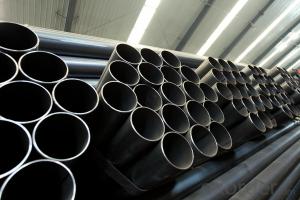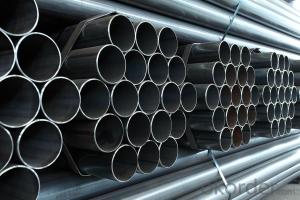Oil and gas erw line pipes API 5L
- Loading Port:
- China Main Port
- Payment Terms:
- TT OR LC
- Min Order Qty:
- -
- Supply Capability:
- -
OKorder Service Pledge
OKorder Financial Service
You Might Also Like
Product | BEST ERW CARBON STEEL PIPE API 5L GR.B | |
Specification | Section shape: round | |
Thickness: 4mm-16mm | ||
Outer diameter: 219mm-2020mm | ||
Standard | ASTM A252, BS1387,GB3091,ASTMA53, B36.10, BS EN1029, API 5L, GB/T9711 etc | |
Material | Q195, Q235, Q345; ASTM A53 GrA,GrB; STKM11,ST37,ST52, 16Mn,etc. | |
Fabrication | plain ends pipe,cutting threading, beveled, 3PE steel pipe, black and color painting, anti-rusting oilsteel pipe, varnish paintingsteel pipe, zinc-coating steel pipe, steel stamp, drilling, diameter reducing pipe etc. | |
Surface Treatment | 1. 3PE | |
2. PVC,black and color painting | ||
3. Transparent oil,anti-rust oil | ||
4. According to clients requirement | ||
Package | 1. Bundle | |
2. Bulk | ||
3. Plastic bags ,etc | ||
Min order | 10 tons, more quantity price will be lower | |
Payment terms | T/T, L/C at sight, western union etc. | |
Deliver time | Within 7-30 days after deposit, ASAP | |
Application | Construction,machine structure pipe, Agriculture equipment pipe, Water and gas pipe, Greenhouse pipe, Scaffolding pipe, Building material tube, Furniture tube, Low pressure fluid tube, Oil pipe, etc | |
Others | We can do special orders as customer’s requests. | |
We also can provide all kinds of steel hollow pipes. | ||
All the production process are made under the ISO9001:2008 strictly | ||
Business type | Manufacture and exporter |
- Q:What do you mean by "SC" in welded pipe SC200? What's the diameter of 200?
- 200 refers to the diameter of the pipe. Personally, you should be an electrical professional, but the electrical specialty rarely uses the 200 pipe diameter unless it is used when the buried cable passes the road;
- Q:What are the different methods of heat treatment for steel pipes?
- Some of the different methods of heat treatment for steel pipes include annealing, normalizing, quenching, and tempering. Annealing involves heating the steel pipe to a specific temperature and then slowly cooling it to make it softer and more ductile. Normalizing is a similar process but involves air cooling instead of slow cooling. Quenching is a rapid cooling process that results in a hardened and brittle steel pipe. Tempering follows quenching and involves reheating the steel pipe to a lower temperature to reduce the brittleness and improve its toughness.
- Q:Can steel pipes be used for culvert applications?
- Yes, steel pipes can be used for culvert applications. Steel pipes are commonly used for culverts due to their durability, strength, and resistance to corrosion. They can withstand heavy loads and are able to handle high traffic volumes and large water flows. Additionally, steel pipes can be easily manufactured in various sizes and shapes to suit specific culvert requirements. Their longevity and low maintenance needs make them a cost-effective choice for culvert applications.
- Q:What are the different types of thread connections used in steel pipes?
- The different types of thread connections commonly used in steel pipes include tapered threads such as NPT (National Pipe Taper), BSPT (British Standard Pipe Taper), and API (American Petroleum Institute) threads, as well as straight threads like NPS (National Pipe Straight), BSPP (British Standard Pipe Parallel), and API threads. These connections are used to ensure a secure and leak-proof joint between pipe sections or fittings.
- Q:What is the difference between steel pipe and HDPE pipe?
- Steel pipe and HDPE pipe are two different types of pipes that are used for various applications. The main difference between steel pipe and HDPE pipe lies in their composition and characteristics. Steel pipe, as the name suggests, is made of steel and is a strong and durable pipe material. It is commonly used in industrial applications and infrastructure projects where high strength and reliability are required. Steel pipes are known for their ability to withstand high pressure, temperature, and heavy loads. They are also resistant to corrosion, making them suitable for both above-ground and underground installations. On the other hand, HDPE (high-density polyethylene) pipe is made of a plastic polymer called polyethylene. HDPE pipes are lightweight, flexible, and easy to install, making them ideal for various applications such as water supply, drainage systems, and agricultural irrigation. They are resistant to chemicals, abrasion, and UV rays, making them suitable for both indoor and outdoor use. HDPE pipes are also known for their long service life and low maintenance requirements. In terms of cost, steel pipes are generally more expensive than HDPE pipes due to the raw material cost and manufacturing process involved. However, steel pipes are often chosen for their superior strength and durability, especially in applications where high pressure or extreme conditions are involved. HDPE pipes, on the other hand, offer a cost-effective solution for applications that do not require the same level of strength and durability as steel pipes. In summary, the main differences between steel pipe and HDPE pipe lie in their composition, strength, durability, and cost. Steel pipe is known for its strength and reliability, while HDPE pipe offers flexibility, ease of installation, and resistance to chemicals and UV rays. The choice between the two depends on the specific application and requirements of the project.
- Q:What are the different types of steel pipe couplings?
- There are several types of steel pipe couplings, including threaded couplings, socket weld couplings, butt weld couplings, flanged couplings, and compression couplings.
- Q:Are steel pipes suitable for underground drainage systems?
- Indeed, steel pipes prove to be a fitting choice for underground drainage systems. The multitude of qualities possessed by steel pipes contributes to their popularity in this field. Firstly, their robustness and endurance enable them to withstand high levels of pressure and heavy loads. Moreover, steel pipes are resistant to corrosion, which prolongs their lifespan and reduces the need for frequent maintenance or replacement. Furthermore, steel pipes possess the advantage of adaptability and versatility in various soil conditions. They can be easily customized to match the specific requirements of the drainage system, encompassing different diameters and lengths. Additionally, steel pipes can be welded together, ensuring a secure and tight connection that effectively prevents leakage and the infiltration of groundwater. Another benefit of utilizing steel pipes in underground drainage systems lies in their capability to handle a wide range of temperatures. Their resistance to extreme heat or cold renders them suitable for diverse climates and environments. Nevertheless, it is important to acknowledge that steel pipes can be more costly compared to alternative materials such as PVC or HDPE pipes. Additionally, their weight and installation process may pose challenges, necessitating specialized equipment and expertise. In conclusion, steel pipes provide a dependable and long-lasting solution for underground drainage systems, particularly in regions where durability and strength are vital considerations.
- Q:Are steel pipes suitable for transporting fluids?
- Yes, steel pipes are suitable for transporting fluids. They have high tensile strength, durability, and resistance to corrosion, making them an ideal choice for transporting various fluids, including water, oil, gas, and chemicals, over long distances. Steel pipes are commonly used in industries such as oil and gas, water treatment, and manufacturing due to their ability to withstand high pressure and temperature conditions.
- Q:Are steel pipes suitable for transporting gas?
- Yes, steel pipes are suitable for transporting gas. They have high strength and durability, making them capable of withstanding the pressure and stress involved in gas transportation. Additionally, steel pipes have excellent resistance to corrosion, ensuring the safety and integrity of the gas being transported.
- Q:How do you determine the maximum allowable stress for a steel pipe?
- To determine the maximum allowable stress for a steel pipe, several factors need to be considered. These include the material properties of the steel, such as its yield strength, ultimate tensile strength, and elongation. Additionally, the pipe's dimensions, wall thickness, and the intended application or service conditions must be taken into account. By considering these factors, along with relevant design codes and standards, engineers can calculate the maximum stress that the steel pipe can safely withstand without experiencing failure.
1. Manufacturer Overview |
|
|---|---|
| Location | |
| Year Established | |
| Annual Output Value | |
| Main Markets | |
| Company Certifications | |
2. Manufacturer Certificates |
|
|---|---|
| a) Certification Name | |
| Range | |
| Reference | |
| Validity Period | |
3. Manufacturer Capability |
|
|---|---|
| a)Trade Capacity | |
| Nearest Port | |
| Export Percentage | |
| No.of Employees in Trade Department | |
| Language Spoken: | |
| b)Factory Information | |
| Factory Size: | |
| No. of Production Lines | |
| Contract Manufacturing | |
| Product Price Range | |
Send your message to us
Oil and gas erw line pipes API 5L
- Loading Port:
- China Main Port
- Payment Terms:
- TT OR LC
- Min Order Qty:
- -
- Supply Capability:
- -
OKorder Service Pledge
OKorder Financial Service
Similar products
New products
Hot products
Related keywords





























